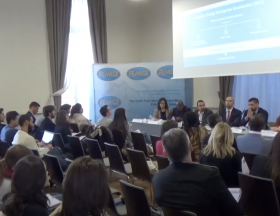For the International Women's Rights Day, Ecomnews Med interviewed Maryse Louis, General Manager of FEMISE. Gender gap, inequalities, violence against women have been aggravated during this pandemic. What can FEMISE recommend for the recovery ?
Women participation in the fight against the pandemic
The pandemic has caused the world to halt and continues to have negative impacts on all economies and households across the world. The world was for once ‘united’ in fighting this war. Each country put all its resources (human and financial) for this fight. Women stand at the front lines for this fight, from health professionals, doctors, nurses, care takers to scientists, teachers, traders to presidents and decision makers.
« In many South Med countries women dominate the health care service. In the MENA region, for every 8 females working in the health and care profession, there are 2 males. In Egypt, there are 9 women for every one man and in Lebanon 10 women for every one man in the health care professionals » said Maryse Louis according to the FEMISE-CMI Medbreifs No 15 by Dilek Gürsel. « Even non-working woman had the burden of providing support in different aspects such as for their children during e-learning, or their elderly. »
However, this crisis has also raised the alarm on how unequal these women are still treated. There is a remarkable gender gap and inequality.
The already existent gender gap, inequalities, violence against women, have been aggravated during this pandemic.
The status of women before the pandemic was already difficult, particularly in our South Med region. « South med countries have one of the lowest levels of equality between men and women: According to the UNDP report, the Gender Inequality Index for these countries ranks between 65 (Tunisia) and 111 (Morocco) out of 189 countries. Moreover, South med Countries have some of the highest female unemployment in the world, averaging about 21% compared to 11.4% for male. Despite their education reaching 108% This is quite high compared to the world average of female unemployment of only 5%. Averaging from 41% in Palestine to 10% in Lebanon. »
Education is no longer an issue : the education levels of women have reached remarkable levels in the South med countries (in some countries surpassing those of men)
« The matter of fact is, those women who are seeking jobs will find it more difficult to access the labour market compared to men, so women already : facing inequality in the opportunities. An employer prefers to hire a man than a women (for equal qualifications) especially in the private sector so as to avoid providing benefits such as maternity leaves,flexible working hours, etc…) ” According to FEMISE Report (FEM43-08),
Once immersed in active life, women are subject to discrimination at work that takes various forms : income inequalities, notable differences in the structure of their career paths, promotions, reaching senior level positions, etc.
The public sector is often preferred by women because of various benefits (long-term contracts, fixed hours, maternity leaves). However, new jobs offered are limited and difficult to access. The private sector, while offering better opportunities, lacks social benefits and security for women (such as maternity leaves, etc.)
What are the results of the FEMISE research ?
Women’s income is less than that of men for the same job; this is true for both Public and private sectors, however in the private sector the discrimination is higher. Also, it is specially pronounced at the low-level public sector jobs and the higher level of the private sector. On average, it was estimated that in selected South med Countries, women received 37% lower wages than that of men on account of an unjustified difference due to gender discrimination
Employment in the private sector is prominent in North Africa. In countries like Egypt, it represents about two thirds of the females employment and about 90% in Morocco which means that more women are working in environments that are not always encouraging.
The region has one of the highest proportions of women with unpaid jobs, including child or elderly carers, agricultural workers, etc. In fact, informal employment in many South med countries represents at a minimum 50.2% of total non-agricultural employment
In the South Med region, almost two thirds of working women (about 62% of total employment) work in the informal market.. Jobs in the informal sector are low-paid, providing no social protection and can leave the person vulnerable, particularity women. For Example, women working in domestic work in the region represent 14% of the world average (which is highest in the world), are mostly informal with no protection (social or economic) (FEMISE-CMI MedbreifsNo 15).
The situation is much worse for refugee women who are facing double discrimination. With no papers or reference for their education or skills, they are forced to work in informal market with appalling conditions (below minimum wage) to earn their bread.
Not to mention the relatively low number of Med women that reach the senior positions or representations in governments, trade unions, etc. in these countries
Impact of the pandemic
The pandemic has encountered great losses for the global economy. According to the ILO, the pandemic has caused a loss of income of about 3.5 trillion US$ in the first 3 quarters of 2020 (ILO). According to a UN Women report, the pandemic will push 96 million people into extreme poverty by 2021, 47 million of whom are women and girls. This will bring the total number of women and girls living in extreme poverty to 435 million, with projections showing that this number will not return to pre-pandemic levels until 2030. (UN Women, September 2020)Moreover, unemployment has increased globally during the pandemic but women were twice impacted than men, for many reasons:
Impact of the Pandemic on the South Med women:
This is no exception for the women in South med region, which have been severely hit, especially taking into consideration their status before the pandemic.
While female unemployment rates might seem constant or even falling in 2020 compared to 2019 in some South Med countries, the reality is that the number of women who have lost their jobs in this year has increased in absolute terms. Women have dropped out from the labour force during the pandemic, as they are unable to seek jobs in the current conditions. This will be translated into an even lower female participation rate, which is already the lowest in the world.
Moreover, 29% of Med women work in COVID high-risk sectors (such as hospitality, services, retail, business and admin services), while 9% work in the medium risk sector, meaning about 40% of Med women are working in COVID vulnerable sectors, according the FEMISE-CMI Medbrief No. 14 by Hussein Suleiman.
In Egypt for instance, while female unemployment seem to have improved from 21% in 2019 to 16% in 2020, the reality is that 700 thousand women lost their jobs. It is also worth mentioning that according to evidence given given in the MedBrief No. 14, the layoffs targeted women more than men in these sectors. Moreover, as the country recovered following the restrictions, only 500K were able to go back to the labour market meaning 200K women lost their jobs.
The picture is almost the same in both Morocco and Tunisia. In Morocco, about 581 000 women lost their jobs in 2020, mostly in manufacturing and agricultural sector, which employ more than two-third of working women. The pandemic has caused women to drop out from the labour force.
In Tunisia, the economy lost 162 000 jobs overall, where 37% of these jobs were occupied by women, however it is to note that women only represent 26.7% of all jobs. So about 10% more women lost their jobs than men. However contrary to Egypt and Morocco, Tunisian women didn’t drop out of the labour force.
Moreover, the number of public sector jobs, which are often favoured by women due to the short working hours, flexibility, and fixed contracts have declined dramatically in the past year.
Recovery will need to include more women
According to an IMF study, if the labor force participation rate of females increases by the same amount as that of males, the GDP will rise by 34% (in 2015). In fact, McKinsey Global Institute, specifies that taking action now to advance gender equality could be valuable, adding $13 trillion to global GDP in 2030 compared with the gender-regressive scenario, while a Mid-term action – which would only be taken after the crisis ends rather than now – would reduce the opportunity by more than $5 trillion.
Hence, some of the FEMISE recommendations include:
This is all to say that the COVID post-recovery era, must ensure more participation of women in the labour markets. However they have to be provided with incentives to encourage them to participate.
In the Short run:
Women participation should be targeted in all governments’ policies. This includes providing targeted support for women who lost their jobs such as cash transfers, unemployment benefits, etc..
There should be equal treatments to Female headed households in receiving households’ cash transfers. In Jordan only 1.2% of female-headed households received aid compared to 5.9% of male-headed households. In other countries such as Morocco and Egypt unemployment benefits do not match the minimum wage of these countries. (FEMISE-CMI MedBrief no. 15)
Measures that will encourage women to return to the labour markets, such as providing safety measures, flexible working hours, the possibility to work from home, etc (family-friendly policies, including flexible programs and part-time programs, to support workers experiencing an increased childcare burden during the pandemic and beyond).
Incentives to employers who employ more women. Incentives for women entrepreneurs such as tax reductions, technical and financial support if needed.
In a Femise study, it was found that female-led firms have higher labour productivity than those of men. (FME43-08) Hence providing and encouraging women to become entrepreneurs could be a great solution, from one hand they are productive in the economy and they can have their own flexibility. Hence providing skills and training to set-up their business would essential.
Encourage women to join new raising sectors such as the digital sector, which will provided needed flexibility and working hours. This could includes providing necessary training.
Ensuring the safety of women in their work space (following COVID guidelines) and in the public transport (which is a major problem in many med countries) such as making available women-only buses
As public sector’s jobs availability is falling, increasing the attractiveness of private jobs that are providing better contracts, flexible hours, onsite childcare facilities if possible, etc.
In the long run:
Improving the labour markets regulations that will encourage women to participate, such as providing support for working women, childcare, better contracts, eliminating pay gender discrimination as a law, especially in the private sector;
Encourage women working in the informal market to be included in the formalization schemes. For example, in Egypt, National Council for Women (NCW) is taking measures to mitigate the impacts of the crisis particularly on informal sector female workers.
Provide paternity’s leaves for fathers (this way parents could share the parental responsibly and women will not need to take long leaves from work)
Encourage women to join new raising sectors such as the digital sector, which will provided needed flexibility and working hours. This could includes providing necessary training
Provide support to women who are facing domestic violence (such as making available hotlines, shelters, etc.) (Gursel)
some actions should be taken to address the problem of unpaid work:
crucial measures to change social norms about who bears childcare responsibilities.
A professionalized childcare industry, with public-financing support, in developing countries, where the social-services infrastructure is less well developed; this could not just enable many women to work but also create employment for many others.
FEMISE research References:
FEMISE-CMI MedBreif no. 14: COVID-19 and Women Employment in Mediterranean countries: Impact and Policies for Reducing Gender Inequality in Work by Hussein Suleyman, ACPSS
FEMISE-CMI MedBreif no. 15: Reducing gender inequality and unemployment among women that were hit the hardest with the consequences of the COVID-19 pandemic by Dilek GÜRSEL
Femise report on: FEM 44-04 Gender Inequalities on the Labour Market in North Africa: Issues, Estimates and Benchmarking of Inclusiveness, by researchers from Erudite (france) and CREAD (Algeria)
FEM43-08: The Feminization of Occupations and its Effect on the Gender Wage Gap in Southern Mediterranean Countries by Researchers from MSA, Egypt, AUC, Egypt and LSE, UK









